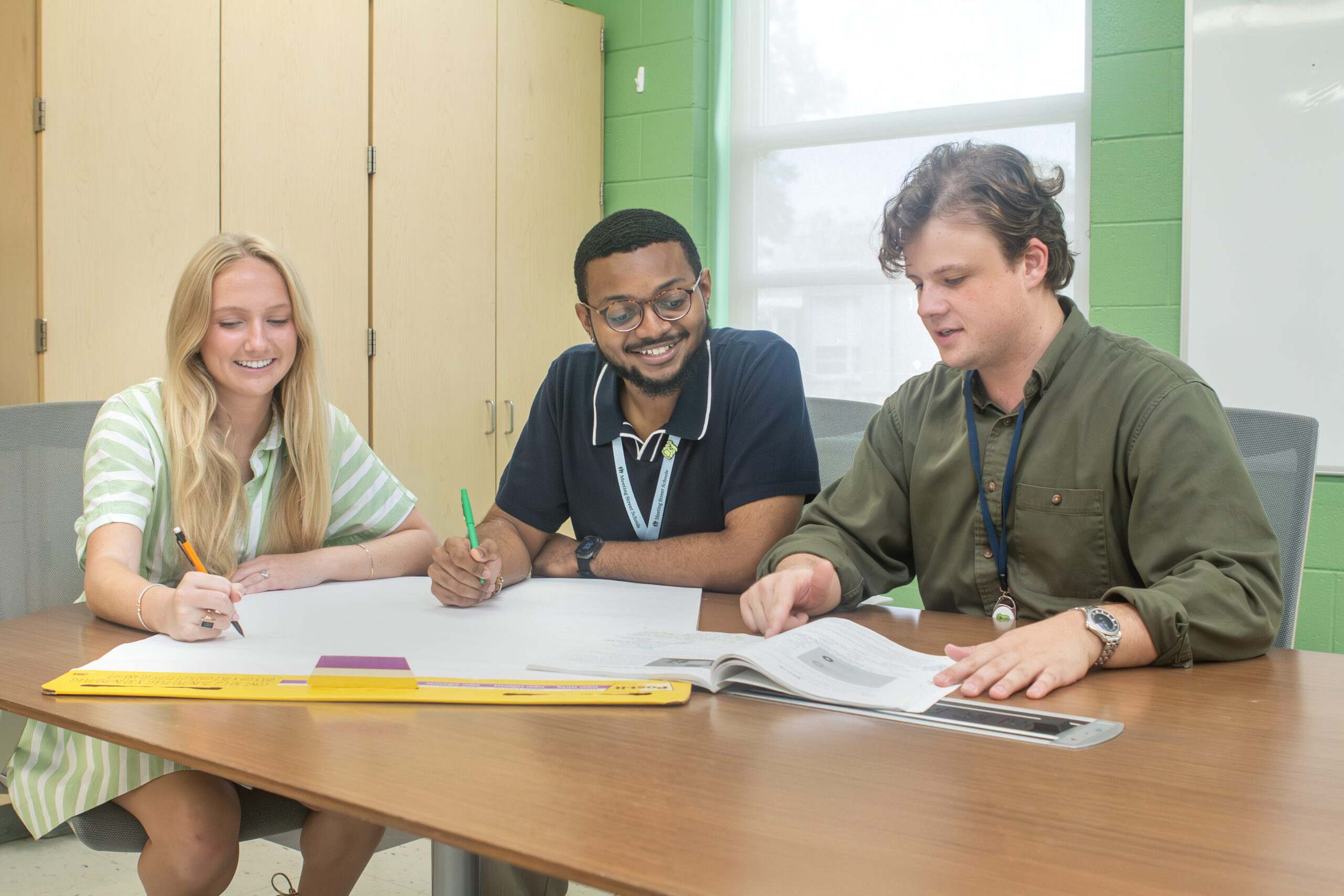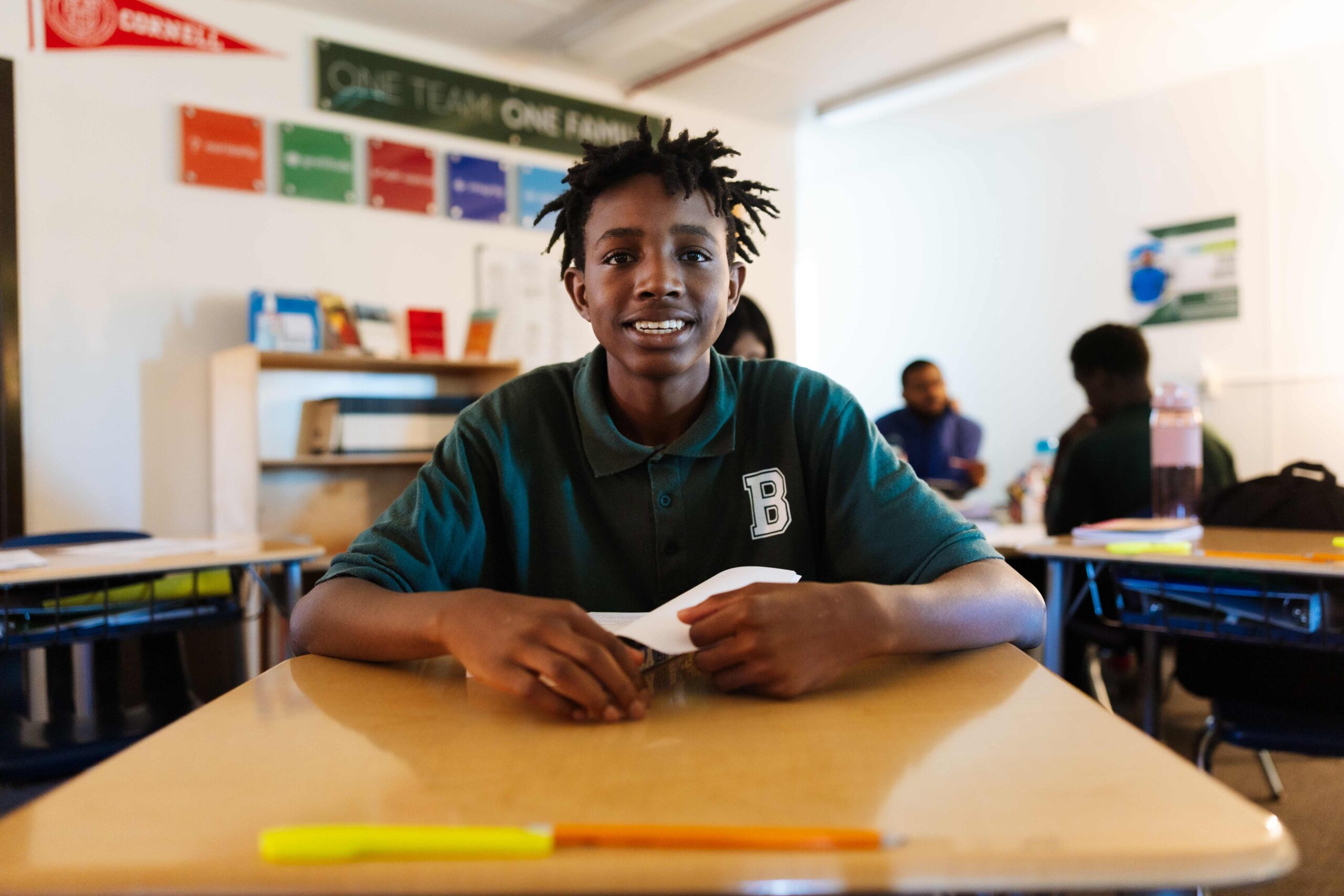
The following is the speech Sydney Carroll, a Meeting Street Elementary & Middle – Brentwood eighth grade teacher, gave to educators during Launch Day, the 2025-26 network-wide professional development event for Meeting Street Schools teachers. In it, she talks about the mindset required for success.
Good morning, everyone!
I’m Sydney Carroll, eighth grade English teacher and grade level chair at Meeting Street Elementary & Middle – Brentwood. Last year, I was also a player-coach, which basically means I was trying to juggle it all: teaching, leading, mentoring, and occasionally (okay… daily) stress-eating salt and vinegar chips in the calm down corner chair.
This is my second year with Meeting Street Schools, but my sixth year teaching. I got into this work because of a truly terrible teacher I had in high school, someone who made me feel small, and like I didn’t belong in the room. And I decided right then: I wanted to do everything I could so that no other student would ever feel that same way.
I believe in the mission of Meeting Street because our students deserve this kind of education – where the bar is high and support runs deep. I tell them that every single day. Why would I waste their time? And why would I waste mine? We show up to be bold. To learn. To grow.
And last year… whew. Last year was a journey.
What wasn’t asked of me?
I started the year flying solo. Me, three classes and a big stack of dreams. Then, mid-fall, after our second round of testing, my principal, Roger Michael, pulled me aside and said he wanted to switch things up and have me co-teach. New rosters. New seating charts. New kids. New packets. Throw it all out and start over. LITERALLY – I had to throw out over 100 packets!
I smiled. I nodded. I said, “OK, let me process.”
And then I drove home, sat in my driveway and cried in my car.
Because I didn’t take it as a change in structure. I took it as a verdict. I told myself: “You are not good enough.”
And that voice got louder. “If you were really good, they wouldn’t be changing your classes. If you were crushing it, they would leave you alone. If you were good enough, the data would show it.”
I started telling myself that this wasn’t collaboration or support; it was damage control for both teachers. That this support was a sign of weakness. That the feedback wasn’t about growth, it was about failure.
And those thoughts? They were heavy. They clouded everything. Even though I had the tools. Even though I had the training. Even though I had the data and experience and instincts. I couldn’t access any of it, because I thought I was a failure. I was stuck in this loop.
That internal switch didn’t flip overnight and I had to confront my negative thoughts, one-by-one.
I started to attend lesson rehearsals at 7 a.m. that I didn’t want to go to, listening to feedback I wanted to argue with. I chose to lean into hard, honest conversations about what it means to truly do the work and holding my peers accountable – instead of doing what I wanted, which was walking away.
I began to fight the old stories I was telling myself.
“Support means I’m not good enough.” No. Support means we are not doing this alone.
“Feedback means I failed.” No. Feedback means someone believes I can get better.
“Change means I did something wrong.” No. Change means we are willing to fight for better outcomes.
Those mental narratives had been weighing me down without me even realizing it. And letting go of them? That’s when I started teaching again…really teaching.
By the end of the year, I looked Roger in the eye and told him he was right. But don’t get it twisted – it took months of personal work to get there and was honestly harder than the actual co-teaching.
Roger, consider this my official “you were right” moment. Enjoy every second of it.
And the growth was REAL. My eighth grade English classes “Magnitude of Growth” from beginning of the year to end of the year was 2.2. This means my students demonstrated more than two years of academic growth in a single year. Our proficiency, or the number of students on grade level, jumped from 4 percent to 21 percent.
Those stats are proof that something different was happening in my class – my students were thinking.
They were building arguments, citing evidence and writing with confidence for 90 minutes straight.
That didn’t happen by accident.
It happened because we have a structure that works.
The daily flow – Do Now, Guided Model, Independent Work Time, Show Calls, Discourse, Closing the Gaps, Feedback Laps, Exit Tickets – it wasn’t just consistent, it was strategic.
And even when I had ideas to tweak things, or push something deeper, leadership actually heard me out. I was trusted to own my block, make it rigorous, and make it mine.
That balance of structure and autonomy? It truly changed the game.
There is one moment that sticks out the most.
Let’s call this student: “A.J.”, who started 8th grade at a fifth grade level and is now heading into high school on grade level. Last year, Roger was coaching me in the classroom. I gave A.J. some feedback during independent work time, and he immediately followed up with a question. I had the answer. I wanted to help. But Roger told me: “Walk away. Come back next lap.”
It felt wrong at first. Like I was abandoning him.
But I did it. I walked away.
And over time, after following that system again and again, A.J. didn’t just get used to the struggle, he started to crave the challenge. Eventually, he looked me dead in the eyes and said, “Can you walk away? I want to try it on my own.”
That’s it. That’s the real win.
Because when we stop hand-holding (at all levels) – when we give the feedback, give the hint, and then walk away – we are empowering our students. When we create that safe struggle, we don’t just build skills. We build thinkers. And we build confidence that sticks.
What I eventually realized was that it was never about me. It was about what the kids needed. What they deserved. I had to learn to trust the process, trust my leaders and most importantly, trust myself; my instincts, my knowledge, my experience. I had it. We all have it. But sometimes we need to get out of our own heads and embrace the moments of change and the honest feedback.
Heading into this year, I feel different. I’ve bought in. I’ve stopped rolling my eyes at the systems and started embracing them. Because it’s not “cool” to coast. It’s cool to be excellent. To be part of a team that holds a high bar for kids, families and one another .
I’m nervous, too. We are kicking off the year with a co-teaching model across content areas. And yes, elementary folks, I hear you: “We’ve been doing this forever.” But for us in middle school, this is brand new. And it’s going to be wild in the best way.
My goals this year are simple: Be a strong grade level chair. Support our new teachers. And have the hard conversations in the moment, instead of letting them build up.
In my classroom, I want my students to feel safe, loved and ready to dive into hard discussions with open hearts and sharp minds – as I am sure most of us align with.
But I also need our proficiency to be more than 21 percent. We can’t let students go to high school without being on grade level. We need to follow the systems in place but be bold in how we implement them.
But I can’t do this alone. None of us can. So what do we need from one another?
Be kind. Say the compliment out loud and by name. Smile in the hallway. Bring someone coffee. Pay for someone’s lunch. Show up to meetings and participate like we expect our students to do. Be consistent with the systems. Our students need us all on the same team.
Ten years from now, my students will be entering college or the workforce. I hope they’re great communicators. I hope they walk into bookstores. I hope they argue with confidence and kindness. I hope they are striving for success in their dream career. I hope they are continuing to critically think, grow through tough decisions, and believe in themselves through the heavy thoughts.
To every educator in this room: you’re here for a reason. Don’t waste your moment. This work is hard. But it matters. And if you’re not going to give it your all, you’re not just shortchanging the kids. You’re shortchanging the version of yourself you were meant to become.
Switch your mindset. Show up. Be bold. Trust yourself!
I believe in Meeting Street Schools because we don’t lower the bar. We believe in more for our students.
So, let’s be all in.
Thank you.



